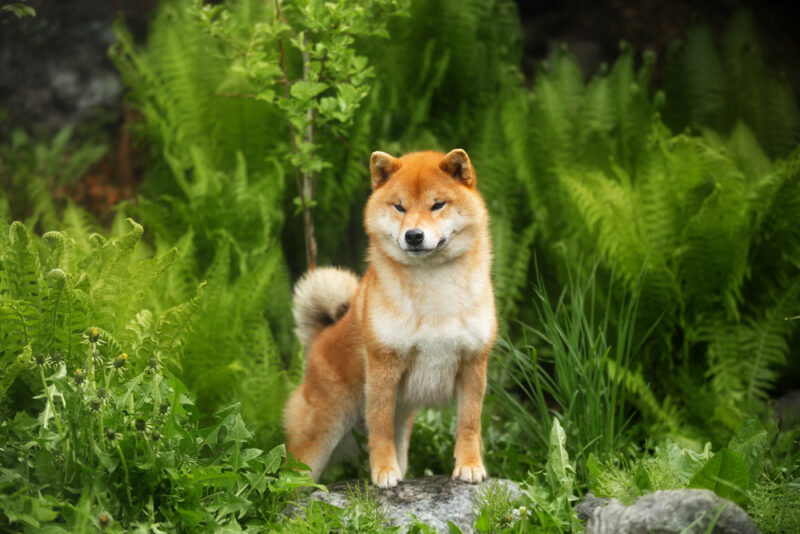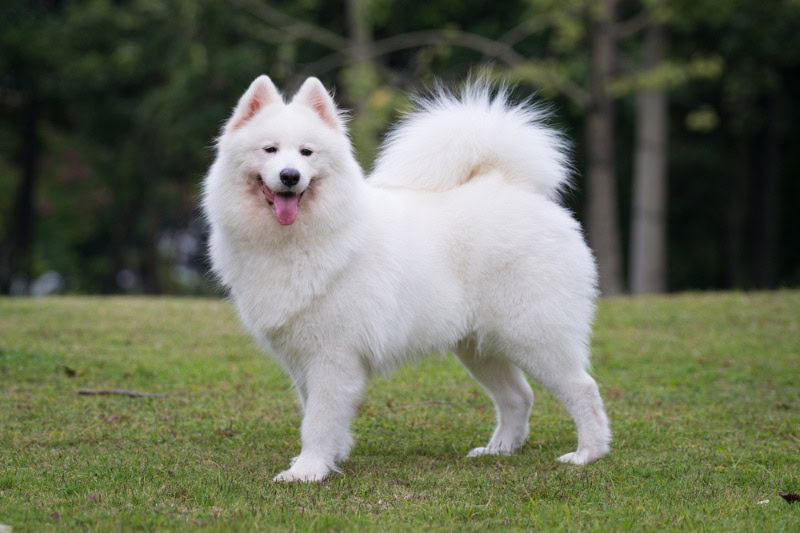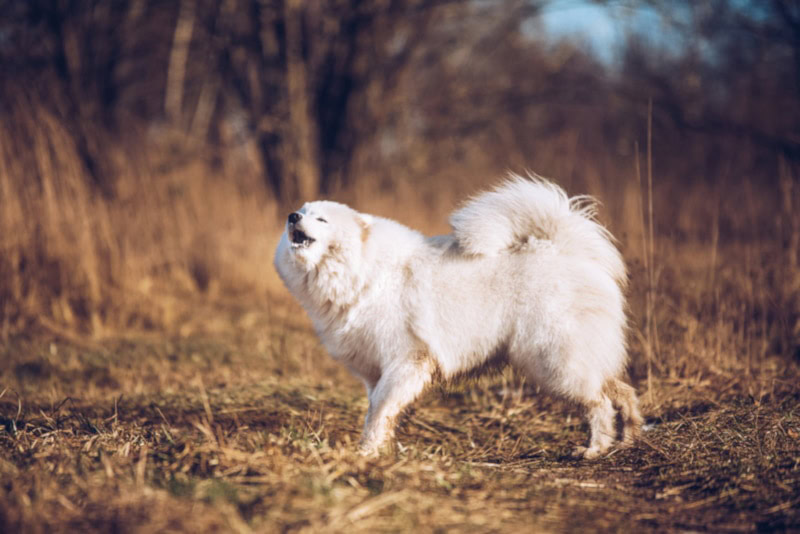VET APPROVED

The information is current and up-to-date in accordance with the latest veterinarian research.
Learn more »Click to Skip Ahead
Samoyeds are known for being very vocal dogs. As well as having a wide array of different vocalizations, they are known to be excessive barkers. They don’t tend to be guarders but will bark to say hello, to welcome you back, and when excited. Some owners also claim that they will bark at anything that passes by the house.
Although they don’t guard people or property, they were bred as herders and sled pullers and would have used their bark to raise an alarm for their handler and also to keep the herd in line, which may explain their willingness to bark.

Samoyed History
The Samoyed is an ancient breed named for the Samoyede people of Siberia that first kept and reared them. They were bred by the nomadic people to live with their families and to assist with everything from pulling sleds to herding reindeer.
Another key role of the Samoyed dog breed was to look after children and sleep with their humans to keep them warm in extremely cold temperatures. In the late-1800s, Samoyeds were used in Polar expeditions and the breed expanded first into the UK and the rest of Europe through this inclusion.
Samoyeds As Pets
The Samoyed’s multipurpose roles within the Samoyede tribe are evident today. The breed is known to be friendly and loving with family, and it gets on well with children as well as adults. However, both a lack of stimulation and excessive excitement in the breed results in excessive barking and other vocalizations.
The breed needs plenty of exercise, having been used to pull sleds. Exercising can help combat any potential problem behaviors and may even help discourage excessive barking.
Samoyeds are intelligent and their utility in a variety of roles shows that they can be trained to fulfill a great range of roles. However, they can be quite independent and even a little stubborn, which makes training a Samoyed a challenge, especially if you don’t start training early.

Do Samoyeds Bark a Lot?
Regular exercise and plenty of mental stimulation can help minimize the amount a Samoyed barks, but it is in their nature to vocalize so you should expect some barking from this breed. It may be impossible to ever completely prevent a Sammie from barking.

Top 5 Quiet Dog Breeds
If you’re looking for a quiet dog, the Samoyed may not be the ideal choice of breed. Here are some other options to consider.
1. Basenji
The Basenji is often referred to as “Africa’s Barkless Dog.” It is quite a small breed but has a lot of personality. Often referred to as being feline in nature but while they don’t bark, they do let out a yodel-type howl when they need to alert their owners to anything.
2. Shiba Inu
The Shiba Inu is a Japanese breed that was also bred for hunting and used primarily to flush prey out for hunters to kill. They are primarily kept as companion dogs today and are known for being bold and courageous. It can be a strong-willed breed, which makes training a challenge and the Shiba Inu is not the best choice for first-time dog owners or handlers because of this.

3. Greyhound
The Greyhound is the fastest dog in the world and can reach speeds of up to 45 miles per hour. However, despite reaching these incredible speeds, they are very laid back and have little stamina, earning the nickname of the world’s fastest couch potato. Greyhounds are sight hounds, which means they chase what they can see, and they rarely bark.
4. Whippet
The Whippet is another incredibly fast couch potato, reaching speeds of up to 35 miles per hour. And like the Greyhound, which is very similar in shape and stature, it is happy laying on the couch and doesn’t tend to bark. The Whippet is smaller than the Greyhound and doesn’t need a lot of space to live a comfortable life.
5. Akita
The Akita is a Japanese breed that was bred to hunt. It is a loyal dog that can be very loving with its family but tends to be wary of strangers. It does require a lot of socialization from a young age, as well as ongoing training. Owners will tell you that Akitas are not prone to barking and if yours does bark, it means that you should pay attention and determine what the problem is.

How Do I Stop My Samoyed from Barking?
Samoyeds naturally want to bark as a means of alerting their owners or handlers to potential problems. This is how they were first raised and it likely isn’t possible that you will be able to train a Samoyed to be completely quiet. However, socialization can stop a Samoyed from barking at unknown situations or when strangers approach, and training can help with teaching the quiet command. Ensure your Samoyed is well-exercised and has plenty of mental stimulation as this will help, too.

Is the Samoyed a Good Indoor Dog?
The Samoyed was bred to live in freezing conditions in tents and in very close quarters with their families. However, they would have spent long periods outdoors especially while herding and pulling sleds. The modern Samoyed needs a lot of time outdoors to exercise and also just to roam. They also prefer the cold weather and can struggle with heat. They do not tend to do well living in apartments or with very little outdoor time.

Conclusion
Samoyeds are vocal dogs that have a range of vocalizations, and they aren’t afraid to make some noise. They can be very heavy barkers, and because it is in their nature, it can prove difficult to train or otherwise stop them from barking.
- https://pawsandlearn.com/samoyed-barking-complete-guide-with-tips-from-owners/?utm_content=cmp-true
- https://www.yourpurebredpuppy.com/reviews/samoyeds.html
- https://www.akc.org/dog-breeds/basenji/
- https://www.countryliving.com/uk/wildlife/dog-breeds/a30546565/quiet-dog-breeds/
- https://www.akc.org/dog-breeds/whippet/
- https://www.akc.org/dog-breeds/akita/
Featured Image Credit: Zanna PesninaS, hutterstock











